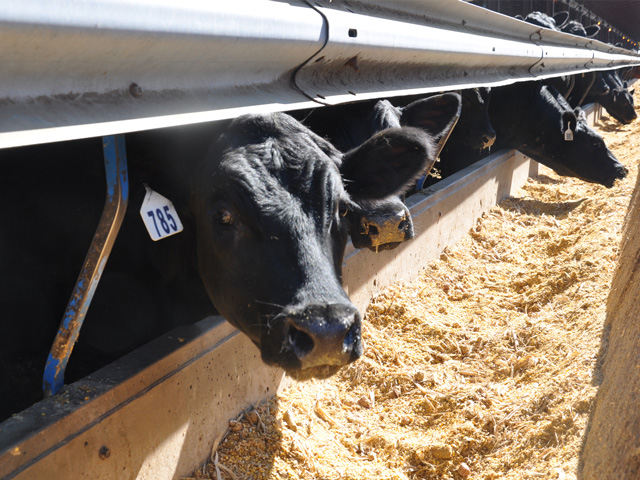Packer Scrutiny Continues
As Federal Antitrust Queries Ramp Up, Packers Seek to Get Civil Case Dropped
GLENWOOD, Iowa (DTN) -- Sen. Chuck Grassley, R-Iowa, on Tuesday credited the Department of Justice for beginning "sweeping initiatives" against the country's four largest meatpackers.
Speaking to reporters during a weekly call, Grassley said a DOJ investigation into packers "is a very important step to protect independent producers, but more must be done."
Bloomberg first reported last week that the Department of Justice had issued subpoenas against the four big packers. Attorneys for the packers in a federal civil court hearing on Monday acknowledged receiving requests for information from DOJ. President Donald Trump was among those who called on DOJ to investigate packer actions this spring when COVID-19 cases began to shut down packing plants. The price of boxed beef hit record highs for packers, while cattle prices fell at the same time for producers.
Grassley said he intends to follow up with a letter to Agriculture Secretary Sonny Perdue seeking a report on the investigation into the Tyson Foods fire in Holcomb, Kansas, last summer that caused a wide spread between cash cattle prices and boxed beef prices. Grassley said he has been asked about the status of the USDA investigation at some of his town hall meetings recently. "So we got a lot of following up to do here. It all affects what the farmers are getting," Grassley said.
DTN reached out to USDA on Tuesday asking about the status of a report on the cattle markets following the Holcomb fire, but did not receive a response.
Grassley and a handful of other senators also introduced legislation last month that would require each packing plant to buy at least 50% of their cattle through negotiated cash trade sales. Since the legislation was introduced, groups such as the American Farm Bureau Federation and National Cattlemen's Beef Association each have issued statements and analysis criticizing the bill as attempts to limit the ways producers can market their cattle.
P[L1] D[0x0] M[300x250] OOP[F] ADUNIT[] T[]
Grassley also said he has not spoken with Senate Agriculture Committee Chairman Pat Roberts, R-Kan., about the legislation. Grassley said he has to have Roberts' support to advance the legislation.
"Why don't you ask Roberts what he is going to do with my bill, and if he is not going to do anything with it, do you think it's alright like a month ago for the price of cattle to go down 60% and the price of food at the supermarket to go up 25%?" Grassley asked. "I don't think he'd say that's justified."
In a related matter, Politico reported Tuesday that attorneys for the country's four largest meatpackers told a federal judge on Monday in a court hearing that the Department of Justice's investigation into packers doesn't justify the civil antitrust suit filed by R-CALF USA and joined by groups such as the National Farmers Union.
The hearing in the U.S. District Court for Minnesota concerned a motion by Cargill, JBS, National Beef and Tyson Foods to have the lawsuit dismissed. The packers argue the claims by R-CALF and others amount to "speculation and gossip," Politico reported. The plaintiffs' attorneys, though, also acknowledged the Department of Justice is asking for information from the packers.
"A government request for information as reported by the media does not make this complaint more plausible," Politico quoted Nicole Saharsky, an attorney for Cargill, as saying.
R-CALF filed the initial lawsuit in April 2019, before the Holcomb fire and before the cattle industry was affected by COVID-19 cases at packing plants. R-CALF's lawsuit claims packers have been coordinating cattle purchases since at least 2015 to reduce the volume of animals they have to buy on the cash market.
While boxed beef has come down from its early May highs, the spread between the boxed beef price and live cattle prices remains historically wide, R-CALF CEO Bill Bullard told DTN.
"The producers' share of that consumer dollar has fallen to what I believe is a historical low below 37%," according to USDA data, Bullard said.
In related news, USDA on Tuesday issued a news release touting the production capacity at meatpacking plants now. The department stated packing plants across the board are operating at 95% of their weekly capacity from a year ago. That breaks down to beef at 98% capacity, pork facilities at 95% capacity and poultry processors at 98% capacity from 2019 levels. USDA cited President Donald Trump's executive order in late April directing packers to remain open or reopen as quickly as possible.
"President Trump took decisive action to ensure America's meatpacking facilities reopen in a safe way to ensure America's producers and ranchers will be able to bring their product to market," Agriculture Secretary Sonny Perdue said in a statement. "I want to thank the patriotic and heroic meatpacking facility workers, the companies, and the local authorities for quickly getting their operations back up and running, and for providing a great meat selection once again to the millions of Americans who depend on them for food."
USDA did not release any figures on the number of workers who became infected by COVID-19. According to the Food and Environment Reporting Network, nearly 25,000 meatpacking workers have become infected with the coronavirus and 90 workers have died from the virus.
Chris Clayton can be reached at Chris.Clayton@dtn.com
Follow him on Twitter @ChrisClaytonDTN
(c) Copyright 2020 DTN, LLC. All rights reserved.



